JavaScript 102
Web Programming Course
SUT • Fall 2018
TOC
- Coercion
- Context
- "use strict";
- Event Loop
- Closure
- Execution Context
- IIFE
- Inheritance
Coercion
More on FreeCodeCamp & 2ality
String(5) //-> "5"
String(true)
Number('5') //-> 5
Number(false) //-> 0
Boolean('') //-> false
Boolean('false') //-> trueExplicit Coercion
Type Conversion
- To String
- To Number
- To Boolean
Coercion
More on FreeCodeCamp & 2ality
'' + 5 //-> "5"
false + '1' //-> "false1"
+'5' //-> 5
0 + '5' //-> 5
false * 1 //-> 0
Boolean('') //-> false
Boolean('false') //-> true
if (2) { ... } // truthy condition
!!2 //-> true
2 || 'hello' //-> 2Implicit Coercion
Type Conversion
- To String
- To Number
- To Boolean
Coercion
More on FreeCodeCamp & 2ality
[] + {} //-> '[object Object]'
{} + [] //-> 0
0 && 'y' //-> 0
1 && false //-> false
'true' == true //-> false
false == 'false' //-> false
null == '' //-> falseImplicit
- Object Type
- && and || operators
- == Loose Equality
- ...
(Implicit) coercion seems hacky when it comes to:
Coercion
More on FreeCodeCamp & 2ality
Object Type Coercion
[[ToPrimitive]]
The optional parameter PreferredType is either Number or String.
- If the input is primitive, return it as is.
- Otherwise, the input is an object. Call obj.valueOf(). If the result is primitive, return it.
- Otherwise, call obj.toString(). If the result is a primitive, return it.
- Otherwise, throw a TypeError.
If PreferredType is String, steps 2 and 3 are swapped. If PreferredType is missing then it is set to String for instances of Date and to Number for all other values.
ToPrimitive(input, PreferredType?)
Coercion
More on FreeCodeCamp & 2ality
Examples
[] + {} //-> '[object Object]'
{} + [] //-> 0
// Can you explain?Context
The this keyword
More on MDN
var test = {
prop: 42,
func: function() {
return this.prop;
},
};
test.func();
//-> 42The value of this is (almost) determined by how a function is called.
Context
- Global Context
- Function Context
More on MDN
// In web browsers, the window object
// is also the global object:
console.log(this === window); // truefunction f1() {
return this;
}
// in non-strict mode
f1() === window; // true
f1.call('my ctx'); //-> 'my ctx'
f1.apply('my ctx'); //-> 'my ctx'
// .bind() returns a new function
// that when called has its 'this'
// set to the provided value
f1.bind('my ctx');- Simple call with ()
- .call(), .apply() and .bind() methods
- As an object method
- with
newkeyword
Context
Example
More on MDN
"use strict";
- Get rid of some JavaScript silent errors
- Let JavaScript engines perform optimizations
- ...
More on MDN
"use strict";
myFunction();
function myFunction() {
y = 3.14; // Err: y is not declared
}x = 3.14; // This will not cause an error.
myFunction();
function myFunction() {
"use strict";
y = 3.14; // This will cause an error
return this; // this === undefined
}Event Loop
An Intro to concurrency in JavaScript
More on MDN
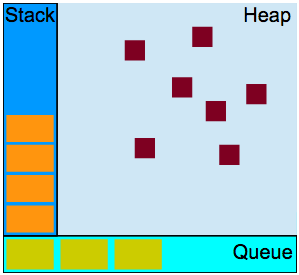
- Why?
- Stack
- Heap
- Queue
- The Loop
Event Loop
Call stack
More on MDN
function multiply(x, y) {
return x * y;
}
function printSquare(x) {
var s = multiply(x, x);
console.log(s);
}
printSquare(5);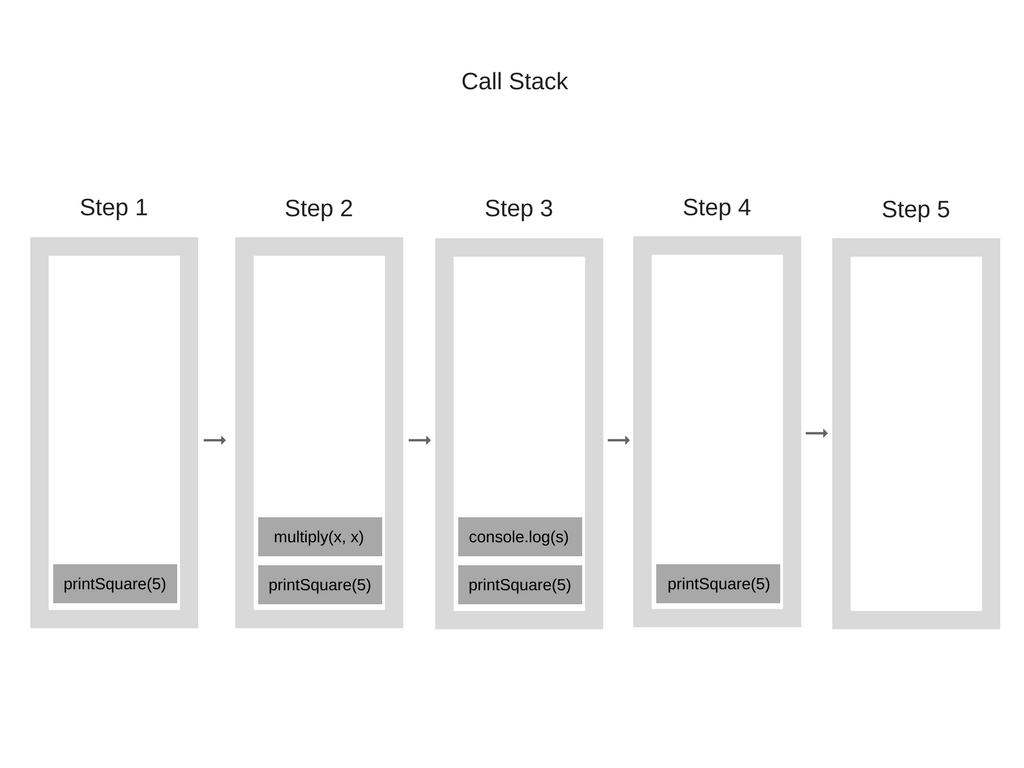
Event Loop
Event Queue
More on MDN
Event Loop
Event Queue
More on MDN
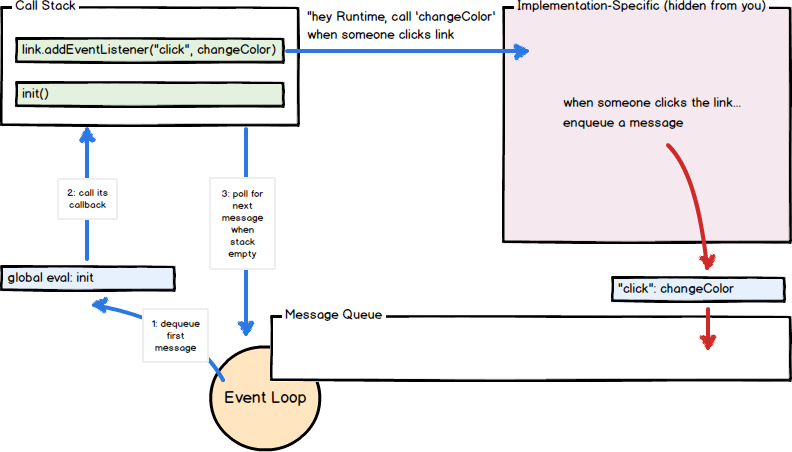
Event Loop
More on MDN
function init() {
console.log('this is the start');
setTimeout(function cb1() {
console.log('this is a msg from call back 1');
}, 2000);
console.log('this is just a message');
setTimeout(function cb2() {
console.log('this is a msg from call back 2');
}, 1000);
console.log('this is the end');
}
init();Event Loop
Zero Delays
function init() {
console.log('this is the start');
setTimeout(function cb1() {
console.log('this is a msg from call back 1');
});
console.log('this is just a message');
setTimeout(function cb2() {
console.log('this is a msg from call back 2');
}, 0);
console.log('this is the end');
};
init();Closure
A closure is when a function is able to remember and access the variables of the outer (enclosing) function.
function makeCounter() {
var count = 0;
return function counter() {
return ++count
}
}
var counter = makeCounter()
counter() //-> 1
counter() //-> 2
counter() //-> 3Execution Context
Read More
Execution Context
Red Pill or Blue Pill?

You take the blue pill—the story ends, you wake up in your bed and believe whatever you want to believe. You take the red pill—you stay in Wonderland, and I show you how deep the rabbit hole goes. Remember: all I'm offering is the truth.
Execution Context
The abstract concept of the environment in which the current code is being evaluated in.
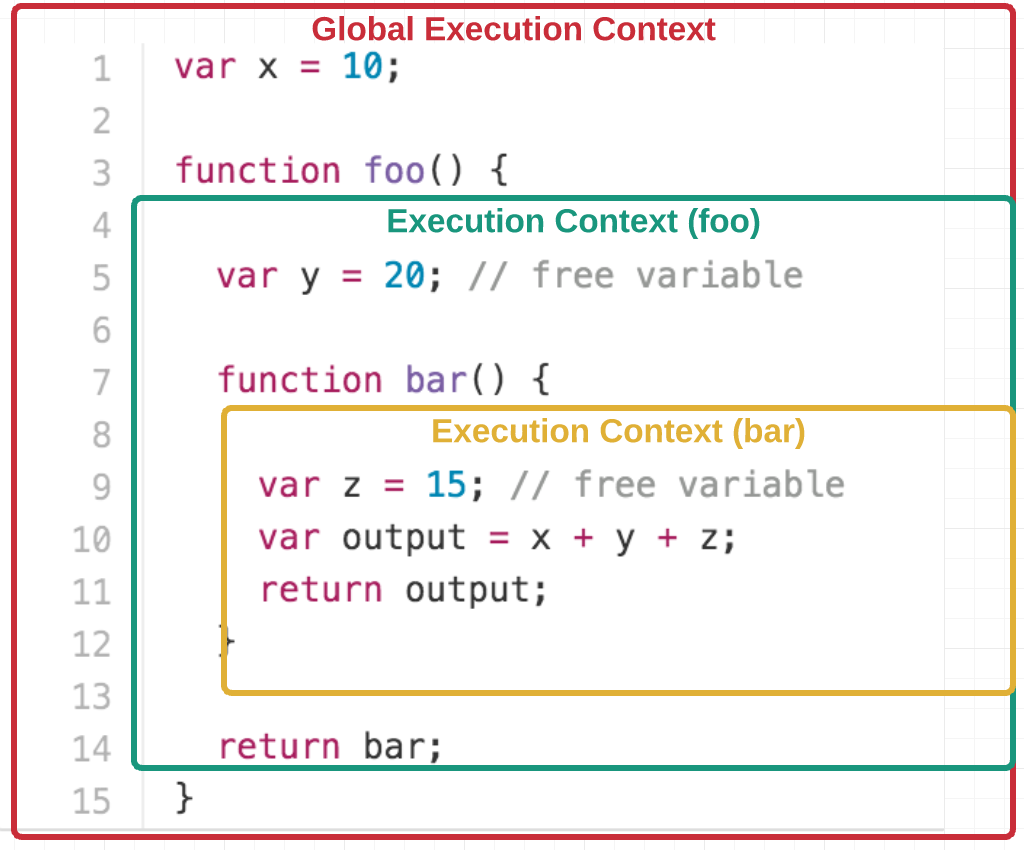
Execution Context
foo(0)
function foo(i) {
if (i === 3) {
return;
}
else {
foo(++i);
}
}The Execution Context Stack (Call Stack)
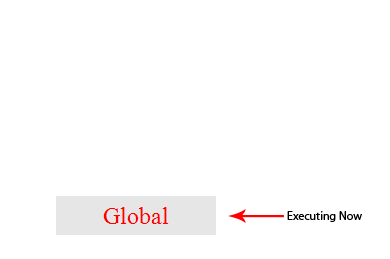
Execution Context
Execution Context Components:
- LexicalEnvironment
-
VariableEnvironment
- Both somehow holds identifiers, var declarations, function declarations, arguments...
-
ThisBinding
- The value of
thisin the associated execution context.
- The value of
Execution Context
Every execution context has two phases:
-
Creation/Pre-execution Phase
- LexicalEnvironment (scope)
arguments, variable (w/ undefined initial value) declarations, function declarations- A pointer to the outer LexicalEnvironment
-
thisbinding
- LexicalEnvironment (scope)
-
Execution Phase
- Assignments, etc.
Execution Context
Creation Phase
foo(22);
var bar = 5;
function foo(i) {
var a = 'hello'; var b = function B() {}; function C() {}
}
GlobalExecutionContext = {
ThisBinding: <Global Object>,
LexicalEnvironment: {
EnvironmentRecord: {
Type: "Object",
bar: undefined,
foo: <Function foo>
},
outer: null
}
}GlobalExecutionContext = {
ThisBinding: <Global Object>,
LexicalEnvironment: {
EnvironmentRecord: {
Type: "Object",
bar: 5,
foo: <Function foo>
},
outer: null
}
}Execution Phase
Execution Context
foo(22);
var bar = 5;
function foo(i) {
var a = 'hello'; var b = function B() {}; function C() {}
}fooExecutionContext = {
ThisBinding: <Global Object>,
LexicalEnvironment: {
EnvironmentRecord: {
Type: "Declarative",
arguments: {
0: 22,
length: 1
},
i: 22,
C: <Function C>,
a: "hello",
b: <Function B>
},
outer: <GlobalEnvironment>
}
}fooExecutionContext = {
ThisBinding: <Global Object>,
LexicalEnvironment: {
EnvironmentRecord: {
Type: "Declarative",
arguments: {
0: 22,
length: 1
},
i: 22,
C: <Function C>,
a: undefined,
b: undefined
},
outer: <GlobalEnvironment>
}
}Creation Phase
Execution Phase
Execution Context
Scope Chain
var x = 10;
foo() //-> ?
function foo() {
var y = 20; // free variable
function bar() { var z = 15; /* free variable */ return x + y + z; }
return bar();
}
Execution Context
Read More
IIFE
Immediately Invoked Function Expression
(function(){
var superSecret = 195;
// more statements
})();
console.log(superSecret);
// Uncaught ReferenceError: superSecret is not defined- To run the declared function immediately
- New local scope for variables
- Module Pattern
IIFE
Read More Here
var MyModule = (function () {
var privateMethod = function () {};
return {
publicMethodOne: function () {
// I can call `privateMethod()` you know...
},
publicMethodTwo: function () {
// statements
},
publicMethodThree: function () {
// statements
}
};
})();
MyModule.publicMethodOne() // works
MyModule.privateMethod() // ERR: undefined is not a functionModule Pattern
Inheritance
- How?
- Prototypal Inheritance vs Classical Inheritance
- Constructors
-
newKeyword -
instanceofOperator
-
- Inheritance & Proto Chain
- Prototype
[[Prototype]]__proto__Object.create()
More on MDN
Topics
Inheritance
More on MDN
function Person (name) {
this.name = name;
}
var john = new Person('John');
john; //-> {name: 'John', __proto__: Object }
var jane = new Person('Jane');
jane; //-> {name: 'Jane', __proto__: Object }Constructors
Calling a function with new keyword makes it an object constructor
Inheritance
More on MDN
function Person (name) {
this.name = name;
}
var john = new Person('John');
//-> {name: 'John', __proto__: Object }
john instanceof Person //-> true- A brand new object
obj{}is created. -
thisrefers to the created objectobj{}. -
obj.__proto__is pointed to theConstructor.prototypeobject. -
obj{}is returned implicitly if the Constructor does not return anything explicitly.
new Constructor();
Inheritance
More on MDN
function Person (name) {
// DO NOT ADD METHODS ON 'this' IN CONSTRUCTORS
this.name = name;
}
// Methods on Person.prototype object
// will accessible by all created objects.
// Notice the value of 'this'
Person.prototype.sayName = function() {
return this.name
}
var john = new Person('John');
var jane = new Person('Jane');
john.sayName() //-> John
jane.sayName() //-> JaneProto Chain (intro)
Inheritance
// Vehicle - superclass
function Vehicle(name) {
this.name = name;
}
// superclass method
Vehicle.prototype.start = function() {
return "engine of " + this.name + " starting...";
};
// Car - subclass
function Car(name) {
Vehicle.call(this, name); // call super constructor.
}
// subclass extends superclass
Car.prototype = Object.create(Vehicle.prototype);
// subclass method
Car.prototype.run = function() {
console.log("Hello "+ this.start());
};
// instances of subclass
var c1 = new Car("Fiesta");
var c2 = new Car("Baleno");
// accessing the subclass method which internally
// access superclass method
c1.run(); // "Hello engine of Fiesta starting..."
c2.run(); // "Hello engine of Baleno starting..."More on MDN
Inheritance
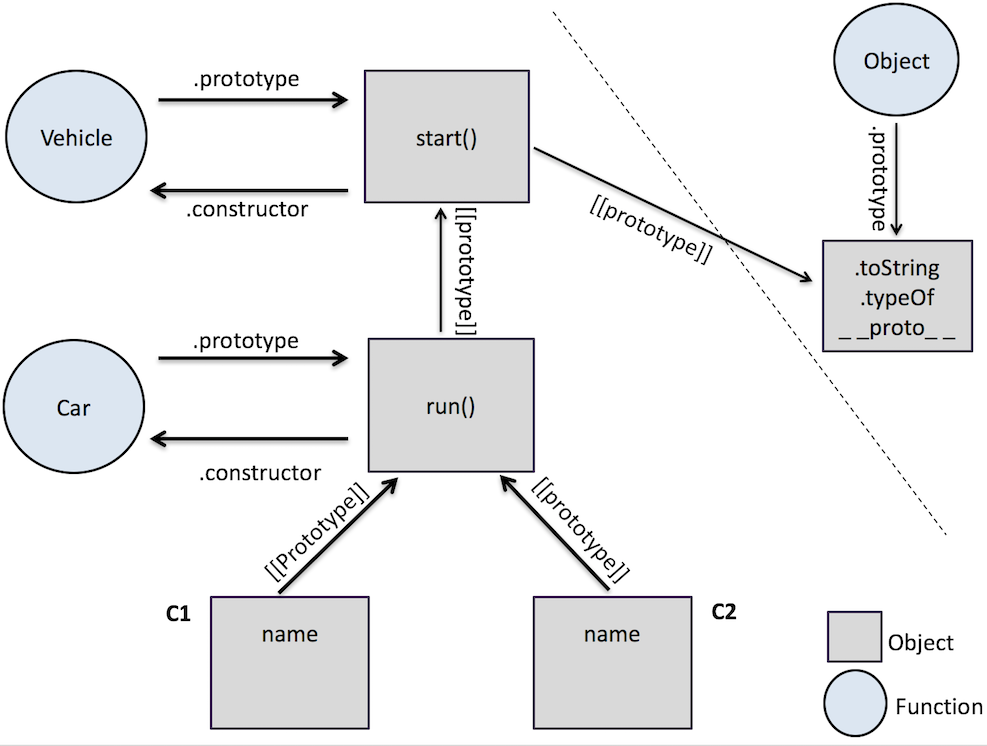
Inheritance
Inheritance vs Composition
The Gorilla/banana problem
What you wanted was a banana, but what you got was a gorilla holding the banana, and the entire jungle
Read More
Inheritance
Read More
JavaScript 102
By Behnam Hatami
JavaScript 102
JavaScript 102 / Web Programming Course @ SUT, Fall 2018
- 2,032



